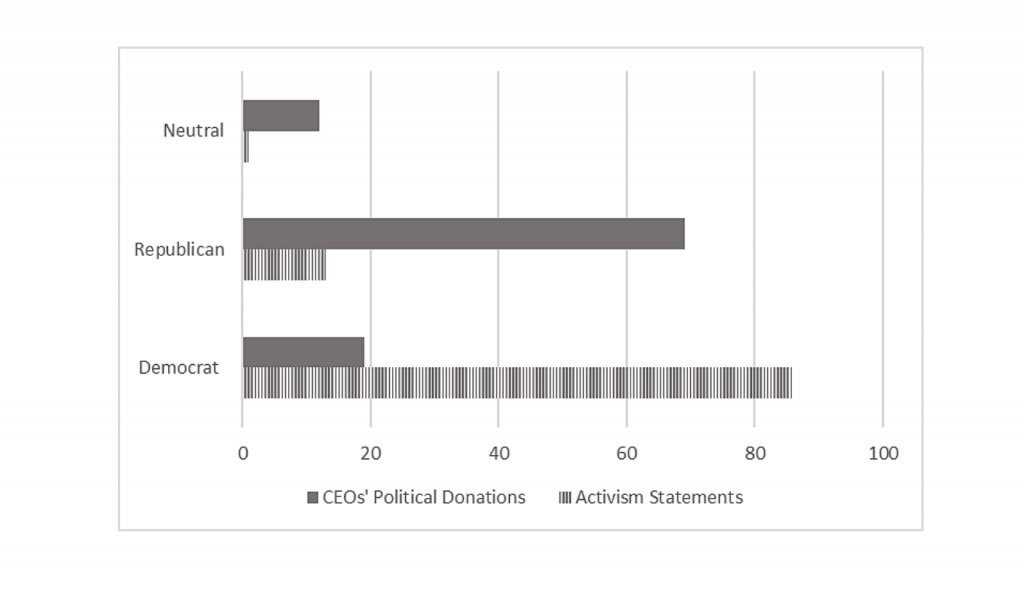A new working paper examines the phenomenon of CEO activism and finds that while statements by activist CEOs are more likely to have a liberal slant, most of them are Republican donors, suggesting that there are financial/strategic motives behind their activism.
In the last few months, the CEOs of large American companies have publicly condemned the murder of George Floyd by Minneapolis police officers.
This is not an isolated incident. CEOs have been increasingly speaking on social issues that are not directly related to their core business interests. Why are CEOs speaking on social issues, and what are the consequences of CEOs’ social activism for their companies?
In a recent working paper, I examine this new phenomenon of CEO activism. Since it is an emergent phenomena, CEO activism has no standard definitions. Using textual analysis of the public statements and social media posts of CEOs, I classify a statement as activism if the CEO comments on gender equality, racial diversity, immigration, gun control, environmental issues, universal health care, and human rights (regardless of the positions they take).
In total, I found 187 activism statements of S&P 500 firms in the 2014-2019 period, most of which are on gender issues, LGBT rights, and racial injustice.
I explore two main questions. First, I examine the motivations for CEO activism. CEOs’ social statements can reflect a growing demand by customers for corporations to engage with societal concerns.
Indeed, a survey by Stanford University shows that customers in the US are supportive of CEOs’ social activism. The risk of taking a stance on a social debate is that the CEO will antagonize people who hold the opposing view. The same Stanford University study found that respondents were more likely to stop using a product because of disagreeing with the CEOs’ activism stance.
This is a concern because social problems have political connotations. For example, in the United States, speaking in favor of racial justice, tighter gun controls, pro-choice, pro-immigration, and more robust environmental protection, is considered as leaning towards the Democratic side of the debate.
Given the political dimensions of social issues, I analyze the content of CEOs’ activist statements. I use the Gallup poll of political preferences to categorize the partisan-slant of CEOs’ activist statements as left-liberal (Democrat) or conservative (Republican).
There seems to be a clear partisan bent to CEOs’ social activism statements. Among the 187 instances when CEOs of large US companies have spoken on social issues, 161 are aligned with liberal Democrat ideologies. Therefore, it is plausible that activist statements by CEOs are motivated by their personal views on the socio-political debates.
To examine that, I collect information on the political donations of US CEOs from the Federal Election Commission. Based on this data, 70 percent of US CEOs are Republican donors. Figure 1 illustrates the partisan bent of CEO activist statements and the political donations of CEOs:

What explains the apparent paradox of Democrat-leaning social statements made by Republican-donor CEOs? Republican-leaning CEOs account for 122 of the 185 activist events in the sample.
Using a linear probability model, I find that Republican-leaning CEOs are 88 percent more likely to engage in social activism with a Democratic-slant. If furthering their own political views was the dominant motive, the CEOs’ political donations and public opinions should be aligned. That we see CEOs speaking on social issues with a partisan-slant that is not always aligned with their personal political donations suggests that such actions can be strategic. CEOs engage in activism not to further their own views, but because these actions can be profitable for the company.
That CEOs are taking a Democrat-leaning stance when their private political belief is pro-Republican suggests that there are financial/strategic motives behind the activism.
In recent years, political polarization in the United States has increased. While conservatives outnumber liberals, the gap is declining fast. If the political opinion of citizens is polarized, the effectiveness of traditional mass-market advertising strategies decreases. If that is the case, catering to the preferences of one side of the political divide can be beneficial.
Indeed, I find that CEO activism is more common among companies that operate primarily in the most politically polarized states like Georgia, Maryland, New York, and Texas, compared to companies that operate in less polarized states. When CEOs express their social concerns, they may not try to voice their own moral or political opinions but trying to attract investors and customers with liberal views.
Next, I examine how investors perceive CEO activism with predominantly Democratic-slant in a politically polarized environment. In an event-study setting, I find a positive market reaction to CEOs’ social activism. In the three-day event windows around CEO social activism, the average cumulative abnormal return is 1.3 percent. Sales revenue of also companies increased in the following quarter. The positive market reaction may imply a lexicographic preference of stakeholders. Democrat-leaning stakeholders positively view the CEO’s social activism, but the Republican-leaning stakeholders have no preference for these activities.
The economic benefits of social activism are more significant for companies selling consumer products in highly competitive industries. I find no statistically significant difference in economic consequences for CEOs proactively engaging in social activism (like the protests that followed George Floyd’s murder) compared to CEOs who are not reacting to a proximal social event.
These results are as timely as they are important and provide, to the best of my knowledge, the first detailed economic analysis of CEO activism. At a time when the economic powers of corporations rival that of national governments, and public trust in political institutions is low, the political ambitions of CEOs are under increased scrutiny. My results show that CEO activism is driven by economic, rather than political incentives.






